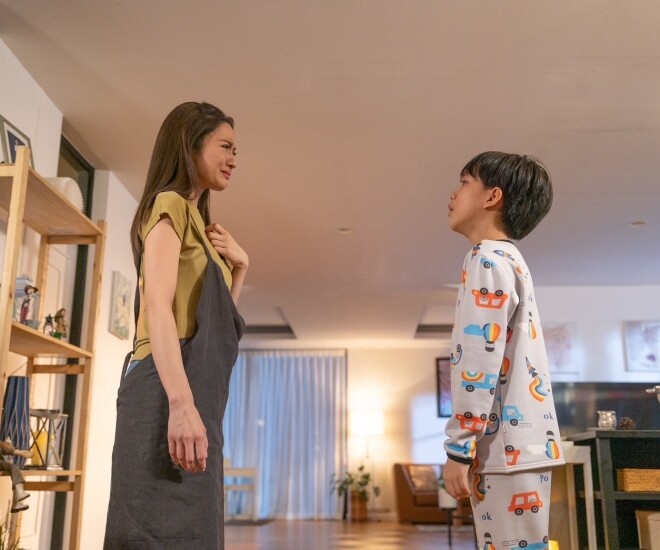Every year, I eagerly awaited Tet just to savor a piece of meat or a bite of bánh chưng, while the rest of the year was filled with vegetables, porridge, and sweet potatoes. My mother was so frugal that she wouldn’t even let us eat chicken eggs, saving them to sell for salt money.
My father was the most educated man in the village, kind, calm, and deeply loving to his children. He once said:
“I was a good student, but poverty prevented me from continuing my education. You two must strive hard; only through education can you escape poverty.”
He taught me to study, told me stories every night, and carried me on his shoulders to explore the village. Those memories were like a dream until my father suddenly passed away when I was nine.
My mother was devastated, left to raise two children alone. The days that followed were filled with her bent back in the fields, harvesting, carrying, and crying. My sister and I were too young to be of much help.
Three years later, my mother remarried. My stepfather was an honest, quiet man, orphaned at a young age. My mother said:
“He’s poor but kind. Having him to support me will ease your suffering.”
But I couldn’t accept him. In my heart, only my biological father deserved that place. Every time I saw him, I was cold, even taking out my anger by snapping at my mother.

Every time I saw my stepfather, I was cold, even taking out my anger by snapping at my mother. (Illustrative image)
My stepfather never got angry. He treated me and my sister as his own children. He worked tirelessly, taking on odd jobs during the off-season, saving every penny. He wore old clothes but always ensured my sister and I had what we needed.
I remember once, he came to my high school gate with some food. As soon as I saw him, I turned and walked away, deliberately avoiding him. He quietly gave the food to my sister to bring in. When I got home, my mother said:
“He was afraid you weren’t eating well in the dormitory, so he waited for you in the midday heat.”
I casually replied:
“I don’t want to see him.”
My mother was furious and wanted to scold me, but he stopped her, saying:
“Don’t blame her, she’s still young.”
I still didn’t understand. In my heart, I always thought he was an outsider, no matter how hard he tried, he could never replace my father.
I went to university, then graduate school. Most of my tuition was covered by my sister, and I flatly refused the money he offered. I thought I didn’t need his fake kindness.
After graduating, I worked, got married, and built a career. I once invited my mother to live with me, but she refused. She and my stepfather followed my sister to take care of her children, even in a cramped rental house. I didn’t understand why she didn’t choose to live with me, who had better conditions.
One summer day, my sister called:
“Dad fell off a ladder and broke his bones badly. Come visit him, he’s done so much for us.”
I hesitated but thought my mother would be happy if I came, so I drove home. On the way, I withdrew 30 million, thinking if he needed long-term care, I could hire someone to help, easing my mother and sister’s burden.
When I arrived, as I stepped into the yard, I heard my mother and stepfather talking inside. He said:
“Don’t push yourself, your back is weak. I can manage going to the bathroom on my own.”
My mother gently replied:
“The doctor said you must stay still. I can handle it.”
Then my mother said solemnly:
“If we had kept that pregnancy, maybe now we’d have a son to take care of you.”
He smiled:
“From the day I entered this house, Minh Khang and Bảo Anh were my children. If we had another child then, it might have made them feel left out. And back then, having another child would have made it hard to provide for their education. I’ve never regretted this.”
My mother choked up:
“You’ve worked so hard for them, giving everything for Khang’s education and house. Yet he still doesn’t call you ‘dad’. I’m just afraid that if I pass away first, he won’t take care of you.”
He replied:
“He loves his father deeply. But I believe he’s a good person.”

Hearing the conversation between my mother and stepfather, I was overwhelmed with emotion. (Illustrative image)
Hearing their conversation, I couldn’t hold back my tears. All my life, I thought he was a stranger, yet he had silently cared for me every step of the way. He was afraid I wouldn’t accept his money, so he gave it to my sister, asking her to give it to me. He had no biological children, but he loved me as his own.
I pushed open the door, knelt by his bed, tears streaming down my face:
“Dad… I’m sorry… I’ve been unfilial…”
Both my mother and stepfather were stunned. My mother sternly said:
“He should kneel. If not for him, you wouldn’t be where you are today.”
He choked up, holding my hand, and turned to my mother:
“Hearing him call me ‘dad’… I’ve lived a fulfilling life. Let him stand up.”
From that day on, I brought my mother and stepfather to the city for treatment. From someone I once shunned, he became the person I loved most.
Three years ago, my mother passed away. Now, my stepfather, over 70, lives with us. I care for him with every meal and every sleep. My children call him grandfather, clinging to him constantly.
Whenever I recall the past, I wish I had realized sooner. But now, I just hope to be by his side for many more years, to make up for lost time, to be filial. Because it’s not the one who gives birth to you who is your father. It’s the one who sacrifices a lifetime for you who deserves to be called father.

































